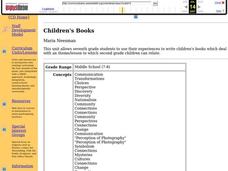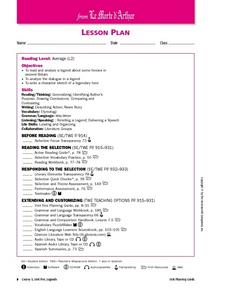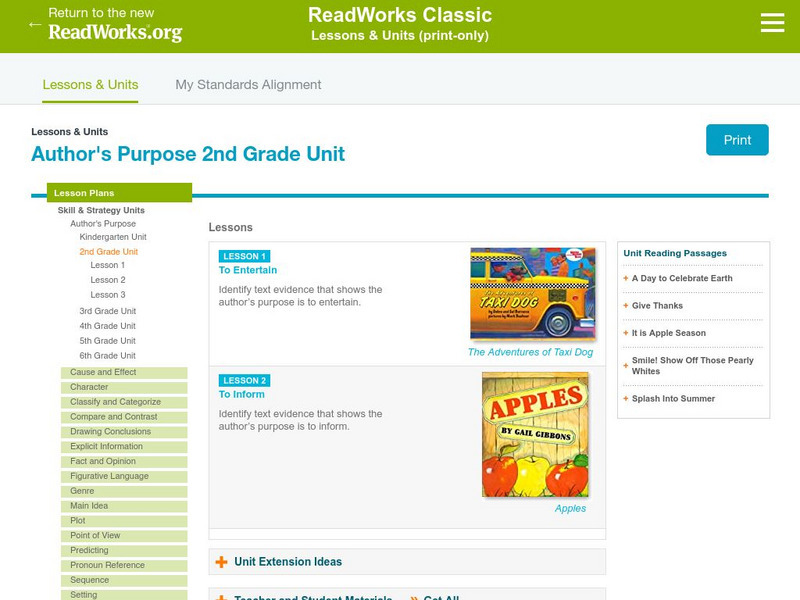Curated OER
Yesterday's Trash
Learners create a trash book or individual student books using cereal boxes. They record everything thrown away and use one page for each category.
Curated OER
Go West Young Man#148
Young scholars determine the difference between immigration and emigration. They read and listen to books about emigration westward during the Gold Rush years. They examine life in Gold Rush towns while determining why gold is so...
Curated OER
The Weather and Recess #157
Learners track the daily weather at recess time for a number of weeks. They design a bar graph of the different types of weather. They discuss how weather changes affect recess time. They write a list of optional recess activities for...
Curated OER
Law of the Sea/ Don't Rock the Boat
Learners read Ronald Reagan's December 27, 1988 proclamation about US territorial waters. They discuss its contents to decipher exactly what it means and to complete a worksheet answering questions about the proclamation.
Curated OER
Did You Feel That? Earthquake Data Chart
Learners plot earthquakes on the world map using coordinates of longitude and latitude. They designate the earthquakes magnitude with a symbol which they include in the map key.
Curated OER
Aqualung , the New Age Garden
High schoolers examine how underwater landscape could be used for food production in the future. They discuss underwater landforms, draw a picture of an underwater landscape and a type of technology to use underwater, and write a...
Curated OER
But They Never Told Me!
Students investigate how government legislates the protection of citizens from natural disasters such as earthquakes in California. They read the Alquist-Priolo Special Studies Act and debate its pros and cons. They discuss how much...
Curated OER
Children's Books
Students explore daily dilemmas students face. They write and illustrate a story book dealing with one dilemma. Students write reviews of their books. They read their books to second grade students. Additional cross curriculum activities...
Curated OER
The Foot Soldier Project for Civil Rights Studies
Students investigate the concept of foot soldiers with oral history. They are provided with primary and secondary resources. Students differentiate the terms of oral history versus the written record of history. They have class...
Curated OER
Glencoe Literature Themes: Legends
Students prepare for and respond to literature selections. This package includes five lessons from the Glencoe Literature series, each covering a different reading selection. Pre-reading and response activities are included for each...
Curated OER
Laws of Reflection
Students experiment with mirrors to explore the Laws of Reflection. In this experimental lesson students develop their own experiments and follow a list of assigned steps then report what happens in their activity.
Better Lesson
Better Lesson: Finding the Author's Purpose
What is autism? How does it affect behavior? Students will find evidence of the author's tone or purpose for writing the article, as well as hints that show evidence of opinion. Includes a video clip from the movie "Rainman", and an...
Read Works
Read Works: Grade 2: Three Lesson Unit: Author's Purpose
[Free Registration/Login Required] A series of three lesson plans designed to teach learners to identify author's purpose including to entertain, to inform, and to persuade. Lessons are based on the books The Adventures of Taxi Dog by...
Read Works
Read Works: Author's Purpose 3rd Grade Unit
[Free Registration/Login Required] A three-lesson unit on author's purpose. In the first lesson, learners practice identifying the author's purpose as to entertain, to persuade, or to inform. In the second lesson, students use graphic...
ReadWriteThink
Read Write Think: Defining and Exploring an Author's Stylistic Choices
Contains plans for two lessons that teach students how to recognize an author's use of style in literature. These plans use "Their Eyes Were Watching God" by Zora Neale Hurston as an example, but the basic ideas can be adapted to other...
TES Global
Tes: Analyzing & Comparing Non Fiction
[Free Registration/Login Required] Resource notes to aid students as they analyze different types of nonfiction. The GAP (genre, audience, and purpose) acronym is provided to use when comparing nonfiction texts.
British Library
British Library: 19th Century Non Fiction Texts: Crime & Punishment
This thematic collection will allow students to read and understand 19th-century non-fiction texts, and support them in identifying key features for a range of genres, audiences, and purposes. Each source is accompanied by original...
Better Lesson
Better Lesson: Work Out Together
Students will read an article and determine the author's point and identify the reasons the author gives to support his or her point. This lesson requires analysis by the students and a great deal of higher-order thinking as they...
British Library
British Library: 19th Century Non Fiction Texts: Work & Welfare
This thematic collection will allow students to read and understand 19th-century non-fiction texts, and support them in identifying key features for a range of genres, audiences, and purposes. Each source is accompanied by original...
British Library
British Library: 19th Century Non Fiction Texts: Gender, Behaviour & Etiquette
This thematic collection will allow students to read and understand 19th-century non-fiction texts, and support them in identifying key features for a range of genres, audiences, and purposes. Each source is accompanied by original...
British Library
British Library: 19th Century Non Fiction Texts: Education
This thematic collection will allow young scholars to read and understand 19th-century non-fiction texts, and support them in identifying key features for a range of genres, audiences, and purposes. Each source is accompanied by original...
Read Works
Readworks: Reading Lesson 3: To Persuade
This instructional activity focuses on identifying text evidence that shows that the author's purpose is to persuade. Draw a conclusion about what the author is trying to persuade the reader to do or think. Text, worksheet, and chart are...
Other
Curriculum Associates: Comparing and Contrasting Texts [Pdf]
In these activities, students are asked to compare and contrast two versions of each event with two pieces of writing that are about the same topic. Teaching notes with answer keys are provided as well.
University of Maryland
Voices of Democracy: John Fitzgerald Kennedy, "Inaugural Address" January 1961
John F. Kennedy's inaugural speech is one of the most famous speeches in American history. Teachers can use this lesson to teach Language Arts standards, as well as Social Studies standards. This lesson plan includes pre-reading ideas,...



















